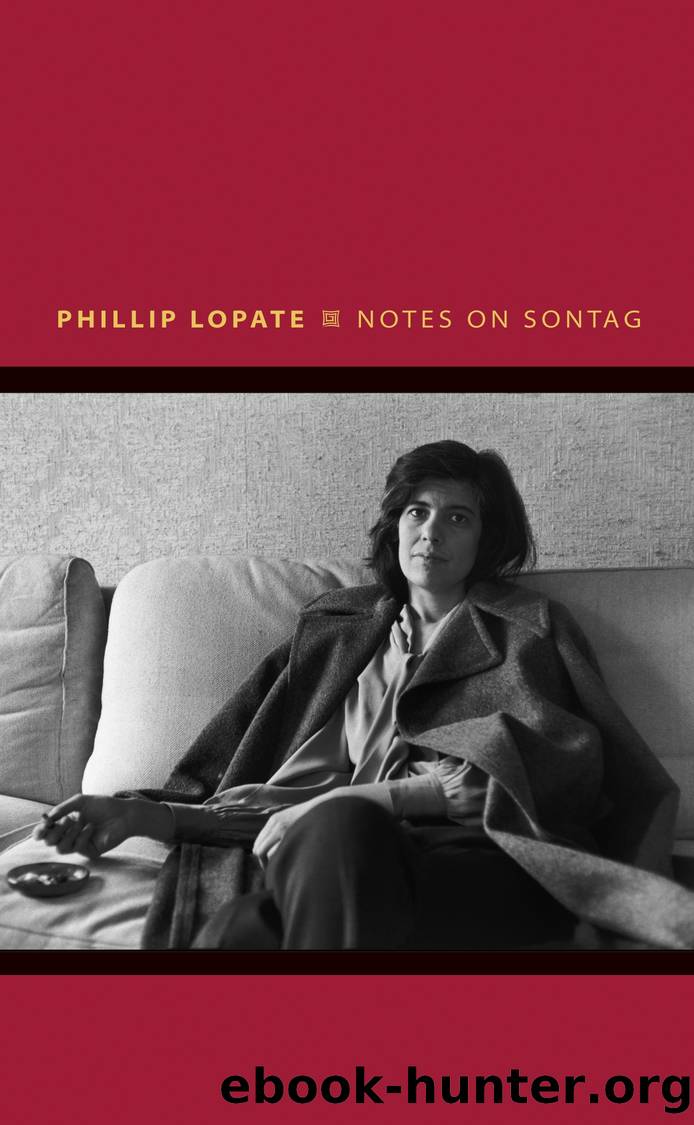Notes on Sontag by Phillip Lopate;

Author:Phillip Lopate;
Language: eng
Format: epub
Publisher: Princeton University Press
Published: 2022-10-20T00:00:00+00:00
âFascinating Fascismâ appeared in 1974, when Sontag had already begun the essays which would comprise On Photography, and both texts worry the morality of photographed images and demonstrate a prosecutorial tone. âFascinating Fascismâ literally uses the device âExhibit A,â âExhibit Bâ to structure her indictment, like a district attorney. The essayâs power derives in large measure from the controlled fury underneath its calm laying-out of facts and exhibits. Of course there are glints of unfair argumentation here and there, such as when Sontag makes the intuitively plausible (but finally overreaching) inference that Riefenstahlâs lavishly captured athletic bodies in motion in Olympia are but another expression of Fascism, or that her loving portraits of the Nuba tribesman are also Fascist and racist at their core. Still, we are with Sontag, 99 percent of us, urging her on, because this time she is attacking Nazis, and so a little unfairness never hurts. We hold our breaths as we watch Sontag go to it, with a rhetorical power rare in this day and age. Not only does Sontag take on Riefenstahl and her defenders, her own friends at the Telluride and New York Film Festivals, and fellow feminists, she also takes on herself, or her past views, with gritty determination.
In the 1965 essay âOn Styleâ she had written:
To call Leni Riefenstahlâs The Triumph of the Will and The Olympiad masterpieces is not to gloss over Nazi propaganda with aesthetic lenience. The Nazi propaganda is there. But something else is there, too, which we reject at our loss. Because they project the complex movements of intelligence and grace and sensuousness, these two films of Riefenstahl (unique among Nazi artists) transcend the categories of propaganda or even reportage. And we find ourselvesâto be sure, rather uncomfortablyâseeing âHitlerâ and not Hitler, the â1936 Olympicsâ and not the 1936 Olympics. Through Riefenstahlâs genius as a film-maker, the content hasâlet us even assume, against her intentionsâcome to play a purely formal role. (ai, 25â26)
Download
This site does not store any files on its server. We only index and link to content provided by other sites. Please contact the content providers to delete copyright contents if any and email us, we'll remove relevant links or contents immediately.
| Books & Reading | Comparative Literature |
| Criticism & Theory | Genres & Styles |
| Movements & Periods | Reference |
| Regional & Cultural | Women Authors |
4 3 2 1: A Novel by Paul Auster(11800)
The handmaid's tale by Margaret Atwood(7459)
Giovanni's Room by James Baldwin(6818)
Big Magic: Creative Living Beyond Fear by Elizabeth Gilbert(5360)
Asking the Right Questions: A Guide to Critical Thinking by M. Neil Browne & Stuart M. Keeley(5360)
Ego Is the Enemy by Ryan Holiday(4962)
On Writing A Memoir of the Craft by Stephen King(4668)
The Body: A Guide for Occupants by Bill Bryson(4590)
Ken Follett - World without end by Ken Follett(4449)
Bluets by Maggie Nelson(4266)
Adulting by Kelly Williams Brown(4239)
Eat That Frog! by Brian Tracy(4163)
Guilty Pleasures by Laurell K Hamilton(4123)
White Noise - A Novel by Don DeLillo(3834)
The Poetry of Pablo Neruda by Pablo Neruda(3821)
Fingerprints of the Gods by Graham Hancock(3741)
Alive: The Story of the Andes Survivors by Piers Paul Read(3737)
The Book of Joy by Dalai Lama(3702)
The Bookshop by Penelope Fitzgerald(3622)
